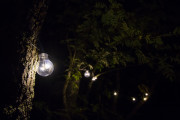2019-12-23
Researchers from Leibniz-Institute of Freshwater Ecology and Inland Fisheries (IGB) in an international team have analyzed data on the impact of light pollution on melatonin formation in humans and vertebrates. They found that even the low light intensities of urban skyglow can suppress melatonin production.
Melatonin synchronizes the day-night-rhythm in animals and humans. It adjusts the circadian clocks of cells, tissues and organs, and regulates other seasonal processes like reproduction. In vertebrates, differences in light levels are detected by photoreceptors for examp...
Continue reading →
 2019-08-23
2019-08-23
A research shows that birds exposed to artificial light at night might increase the spread of West Nile Virus (WNV).
West Nile Virus that infects birds and other animals including humans. The virus can cause West Nile fever for people and sever disease in horses. The virus is transmitted by birds and mosquitos.
The study led by Meredith Kernbach, a PhD student in the University of South Florida College of Public Health, suggested that wild birds who carry the virus would remain infectious two days longer if exposed to artificial light at night time, leading to h...
Continue reading →
 2019-08-23
2019-08-23